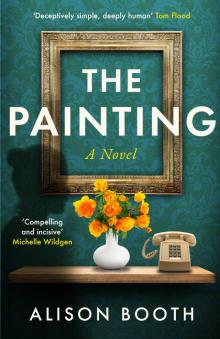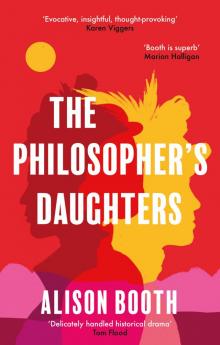- Home
- Alison Booth
The Painting Page 19
The Painting Read online
Page 19
‘Don’t you want that brandy, Anika?’
When she shook her head, he picked up the glass from the bedside table and raised it to her. ‘Here’s to a quiet life, Anika,’ he said, laughing.
He downed the lot in a gulp and kissed the top of her head. And then he was gone and she was left feeling alone. She’d hoped that he would support her but he wasn’t interested. It saddened her that she no longer knew who he was. In part this was because she’d changed, probably beyond all recognition. But so too had he: she’d thought of him as always staying the same but of course that couldn’t have been true. What she did recognise, though, was that he was so busy looking forward that he couldn’t afford the time to take a glance at what lay behind.
Chapter 27
New Year’s Day was a sober affair. Anika spent it in the company of a hangover that went only with a ten-hour sleep that night. Miklos returned to Szeged the day after. She was sorry to see him go. Before he left, he repeated those words she hadn’t been able to get out of her head: just get on with your life, Anika. She didn’t argue with him, though she wanted to say that if they applied that mantra to everything, they would wipe out every injustice, and by doing so they’d let bad deeds go unpunished. And that would make it more likely they would happen again.
Still she delayed asking Nyenye about how Tomas got hold of the painting. It was partly getting on with her life. It was partly cowardice on her part, but it was also that she didn’t want to put Nyenye through that grief again. And overlaying it all was that sense of foreboding, for she dreaded having to ask Nyenye difficult questions, knowing that her grandmother’s answers might change everything that she’d ever thought about her family. She’d been working herself towards this for months and, now the time was near, she couldn’t bear the thought of what she had to do. Of what she might discover. Of course, she didn’t need to do it right away. She could wait a few more days before doing anything to upset Nyenye.
It was easy to compartmentalise her life. After Miklos’s reaction and his advice, she steered away from suspicions as if they were poison. She lived each day in the present. Like a horse without blinkers, she was distracted by the pleasures of seeing family and friends, the delight of being on holiday.
But sometimes she woke at night in a hot sweat, tangled in sheets so taut they might have been a straitjacket, and full of fear that the construct of her family that she’d held in her head all her life was an artifice. Simple honourable people, that’s how she’d thought of her family while she was growing up and through the years she’d been away. That thought had sustained her. It had defined her identity. But what if they were instead opportunists, profiteers from war? Unless she asked more questions, she’d never know the truth. Yet she didn’t want to hurt anyone: she didn’t want to hurt her family. And also, she told herself on those long nights when she awoke sweating and full of dark fears, her inner critic at its harshest and accusing her of weakness, that she didn’t want to hurt herself.
* * *
Early one morning Anika went to the market, her first visit for years. She’d always loved its vast lofty space and today the sky blazed cobalt blue through the glazing, and the oblique light illuminated stalls laden with produce, all so well-ordered and beautifully arranged that it almost seemed a shame to buy anything that destroyed this symmetry. She filled her carry bag with the vegetables Mama wanted. For a while she lingered before the stall displaying strings of garlic bulbs and dried paprika. She’d thought of these sometimes when she was away; they seemed to symbolise home, for there was always a string of each hanging in the kitchen and she’d never seen garlic and paprika arranged like this in Sydney. The sunlight sluiced over the display, the brilliant white of the garlic bulbs contrasting with the peppers that glowed in shades of red and ruby and maroon. Today Anika found them impossible to resist, although they were not on Mama’s list, and she bought five bulbs of garlic on a raffia plait and two dozen or more Kalocsa paprika threaded together. She knew that Nyenye would love them.
When she rang the bell to Nyenye’s flat, her grandmother took a while to answer, though Anika could hear her footsteps in the entrance hall. She called out her name and, soon after, bolts clunked open and there she was, peering around the edge of the door, the chain allowing it to open no more than a few centimetres. Grumpy was the best way to describe her expression but annoyance and anxiety vied for second place. Her face didn’t alter when she saw Anika but without a word she unhooked the chain and the door swung wide open.
‘There was a man here first thing this morning looking for you,’ she said at once, her body barring the way. ‘He was really pushy. He went on and on and on about how he knows you and was really hoping to see you while he’s in Budapest.’
‘Who was he? Did you ask?’ Right away Anika thought of Jonno. She knew he was in Eastern Europe somewhere and he was given to stalking her when he wanted something. Journalists had big strides and after the Berlin Wall had come down a few borders were unlikely to block him.
Nyenye ignored Anika’s questions, so tangled up was she in the skeins of her irritation. ‘You know he actually put his foot in the door when I tried to shut it. What a cheek, I couldn’t believe it. You’d better come right in, Anika, instead of hanging about on the landing so the whole world can hear our conversation.’
She ushered Anika into the flat and shut the door behind her. ‘Fortunately, Dori Nagy came by just when that man was becoming really annoying. So I called out to her and told her he was being a nuisance. “I’ll phone the police if you don’t go,” she told him. I would have had to ask her not to though. I don’t want the police coming here either. He’s not your boyfriend, is he, Anika?’
‘I don’t have one. Did you ask for his name?’
‘I clean forgot, I was so upset.’
‘If he comes again, don’t let him in.’
‘You bet I won’t. I’m keeping the chain on all the time now. I don’t like being pushed around.’
‘Did he actually push you, Nyenye?’
‘No. He just put his foot in the door. He said you’d mentioned that I have some pictures. I really wish you hadn’t done that, Anika. No one is supposed to know about these paintings.’
‘I didn’t tell anyone about your paintings, honestly. What did this man look like?’
‘Hard to say. I only caught a glimpse of him over the chain and the light was behind him. He was all rugged up in winter gear and quite big. Anyway, I was more focused on getting him to go away. Oh, and one more thing: he had a funny accent.’
‘He spoke Hungarian?’
‘No. German.’
‘Nyenye, I promise that I didn’t mention your paintings to anyone.’ Anika put the strings of garlic bulbs and paprika on the kitchen table. ‘These are for you. I went to the market.’
Nyenye gave her a hug. ‘You’re a darling,’ she said. ‘Was it crowded?’
‘I went early.’
‘Let’s have some coffee, no?’
Once Nyenye had made it, she picked up the tray and Anika followed her into the living room and avoided looking at the walls where the paintings hung. After putting the tray on an occasional table near the door, Nyenye flicked the light switch. Only one of the bulbs in the chandelier lit up and Anika thought it couldn’t have been any more than sixty watts. No artificial lighting would be necessary if only Nyenye would open the curtains; the morning light would stream through the three tall windows along one side of this room. Two of them had ancient velvet curtains drawn across, but not much daylight came in the window with the curtains open, for behind the velvet there was a layer of net curtains so thick and bunched up that, even standing by the window as Anika was doing now, she could see little of what was outside. If she spread the netting smooth and taut, she could just make out the shadowy outline of a building on the other side of the road and the shape of a tree, its branches bare.
She lifted the material slightly to see better.
‘Don’t open the curtains.’ Nyenye’s voice was suddenly harsh.
‘No one can see in.’
‘You never know,’ she said. ‘They might have binoculars.’
‘Those days are over,’ Anika said firmly. But suddenly she felt an acute sense of foreboding that made her shiver. There must be more to Nyenye’s paranoia than fear carrying over from the old regime, for who would pursue her now if the paintings were bona fide purchases? But if they weren’t, she could well be in trouble.
‘I’m not so sure those days are over,’ Nyenye said. ‘Some of the secret police will be hanging on to the files of certain people. They’ll use the information for blackmail if they need to. You can never be sure that the new regime won’t change into the old. When you’ve lived as long as I have you’ll realise that.’
After they were settled in their chairs, with the tray between them, Nyenye said, ‘Is something bothering you, szeretet? You look like you have another question for me.’
‘I’d like to know more about Tomas.’
‘You have only to ask,’ she said slowly. ‘But of course memory is a funny thing. No two people remember something in the same way. My brothers and I had wildly different recollections about our childhood. They were much older than me so that might be part of it, and they were boys too with more freedom.’ She hesitated. Neither of her brothers survived the wars; one had died in the First World War and the other in the second. ‘But everyone sees the world in their own way and they process what they’ve seen in their own peculiar brain. And it’s not just that people notice different things. Some of them are in their own world half the time and a lot of things pass them by completely.’
‘And they block out things too, Nyenye. Even if they’ve observed them.’
‘People do that to survive. Some are better at it than others. Such terrible things we’ve lived through, some of us. The only way we can cope is to bury them deep inside us and carry on.’
Is that you, Nyenye? That’s another question Anika would have liked to ask but it seemed too bald, especially as she could hear the sadness in Nyenye’s voice. Anyway, there were more pressing questions that required answers and she needed to be more direct. ‘Did you know that Tabilla didn’t want Tomas’s painting? She said it brought back bad memories, so she gave it to me.’
‘It brought back bad memories to me too, darling. But not of Tomas. And I’m very glad you have it.’
Anika took a deep breath before she told her. ‘I don’t have it any more, Nyenye.’ She explained about the robbery.
Afterwards, Nyenye bombarded Anika with questions. Were any other things taken. Were the police called in? What did they do? Was there any likelihood she’d get the picture back? At the end of her interrogation, she said, ‘The most important thing is that you and Tabilla were unharmed.’
‘All that was taken was the painting.’
‘So someone knew about it. That’s another reason not to tell anyone about my collection. Once people know you have something of value they start to envy you or want if for themselves or start thinking you got it illicitly.’
Anika didn’t want to tell Nyenye about Julius Singer, not yet. Nyenye was glancing around the room, and Anika hoped she was not going to offer her a replacement picture. If she did, she’d have to decline. Provenance was all, and Nyenye almost certainly didn’t have any. The sad thing was that Anika used to love this room and all the paintings on the walls but at this point she felt she simply couldn’t bear to look at them. All she wanted to discover today was how Tomas got hold of the Rocheteau. Thinking about this gave her the heebie-jeebies. Her hand started to shake and the cup rattled in the saucer. Carefully she put it down before beginning to speak.
‘Do you know where Tomas got that painting from, Nyenye? Papa told me he thought you’d said it might have come from the consignment store.’
‘It didn’t.’ There was not a trace of doubt in Nyenye’s voice.
‘But you and Nagypapa got some of your pictures from there, didn’t you?’
‘Yes, and from collectors who needed the money. Your grandfather and I worked really hard and we did well with the butcher’s shop. People have to eat, you see. And later we expanded into pickles. That was my idea, and I made them right here in this kitchen using my grandmother’s recipes. They were a great success; people came from all over Budapest to buy them. But in those days, before the regime loosened up, you wouldn’t want to have a savings account that might alert the state to your profits. And neither of us thought it would be a good idea to put our hard-earned cash under the mattress, so we bought paintings instead.’
‘And was that where all these came from?’
She looked away. ‘We took advice on what we should buy.’
‘Who from?’
‘Collectors, mostly. Richer people who’d fallen on hard times.’
‘But you told no one?’
‘That’s right, Anika. We didn’t want to get anyone into trouble. Private art sales were illegal.’
‘That’s what Papa said.’
‘These are all by Hungarian artists.’
‘All of them?’
‘All of them. I insisted on that. And Hungarian artists’ paintings couldn’t be taken out of the country so we got them cheap.’
For a few seconds Anika felt a sense of great relief that the paintings were purchased not stolen by her grandparents. That was before she remembered they could have got the paintings cheap because they’d been looted by someone else and offloaded on to her grandparents. She pushed that thought to the back of her mind. Right now, she needed to concentrate on the Rocheteau. She said, ‘What about Tomas’s picture?’
‘I never knew who painted that. It was Tomas’s, you see. But I was pretty sure it wasn’t Hungarian. There was something about it that didn’t look Hungarian. And anyway, it came from a different source.’
‘Well, we know it wasn’t from Sebestyén Tinódi. So where did Tomas get it from?’ There was a fluttering sensation in Anika’s chest. Please God, don’t lie to me, Nyenye.
Nyenye looked at her in surprise, as if she’d never heard of Sebestyén Tinódi, and Anika wondered if her grandmother had already forgotten that lie or the conversation they’d had only a few days ago. Nyenye said, ‘It was after the siege of Budapest.’
‘When the Russians came?’
‘Yes. After the Germans had been driven out. The city was in a terrible mess because of all the bombing. There was rubble everywhere, shelled buildings, dead bodies lying in the streets, homes in ruins. We were living in the cellar that was all that was left of our apartment block, we lived closer to the river then. And we shared that cellar with a lot of other people. When we went out sometimes there was so much debris lying around you couldn’t even tell where the streets were, and the place stank. Everywhere the Russian soldiers were drunk and out of control and there was looting. And worse.’
She paused and Anika watched her face and the twitch that had started up below her left eye. Anika’s own stomach began to churn and she felt conflicted about what she was doing. This need of hers to know the truth was costly for Nyenye, putting her through a painful revisiting of the past.
‘They were not all barbarians,’ Nyenye continued. ‘Just most of them. There was a Russian man who befriended Tomas. He had children of his own and he said that Tomas reminded him of his son. He was an officer, very kind, and he visited us a few times. The last time he came he gave Tomas the painting. I don’t know where he got it from, stolen probably.’
‘Stolen?’
‘Oh yes, it must have been stolen. The Germans left things behind. Things they’d taken, for who goes into battle with paintings or antiques? Or things they’d looted from Hungarians. And then the Russians looted them back again. The Russians were
like that, Anika. Their commander had granted them three days of looting and more to celebrate their victory. But Tomas loved that painting. Not because we thought it was valuable but because it was something beautiful after all those months of shelling and violence and hunger. He hid it as soon as the Russian officer, Sergei was his name, had gone. In case there were more visits from other soldiers who might take his painting away again.’
A veil had come down over Nyenye’s eyes. Although they were still open, the light had gone out of them. The skin under her eye continued to twitch as she began to speak again, so softly that Anika had to lean forward to distinguish the words. ‘And we did have more visits, Anika, but they were not from Sergei. It was me and the other young women the soldiers were after.’
Anika’s throat suddenly became so constricted that she could scarcely breathe.
Of course, she had known of the rapes by the Russian soldiers but she hadn’t thought that Nyenye might have been one of the victims. Yet she knew it was a failure of her own imagination not to even contemplate that her grandmother might have been affected. ‘We won’t talk about this, Nyenye,’ she said gently. ‘There’s no need.’
‘But I want to tell you about it,’ Nyenye said. She picked up her coffee cup with a trembling hand and took a sip. ‘It was hard to start telling you but now I’ve begun it would be harder still to stop. When the fighting and looting and raping were all over, and we were struggling to rebuild our lives, Tomas retrieved the painting. It meant a lot to him. He was an artistic boy.’
‘Like you.’
‘Your grandfather and I both loved paintings.’
Anika could understand why. Beautiful objects after a violent history, after all those months of shelling and violence and hunger and ugliness, and after the police regime that followed. Barely registering what she was looking at – the fusty curtains over the window, the feeble light – Anika felt her suspicions slowly trickle away, to be replaced by admiration for this strong woman, her grandmother.

 The Painting
The Painting The Philosopher's Daughters
The Philosopher's Daughters A Distant Land
A Distant Land A Perfect Marriage
A Perfect Marriage Stillwater Creek
Stillwater Creek The Indigo Sky
The Indigo Sky